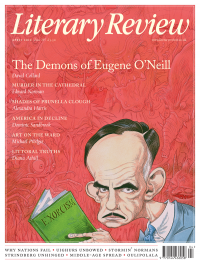Eric Kaufman
Coercion Doesn’t Pay
Why Nations Fail: The Origins of Power, Prosperity, and Poverty
By Daron Acemoglu & James A Robinson
Profile Books 529pp £25
It’s the institutions, stupid. This is the message of this accessible book, written by two of the world’s leading political economists. It is a welcome tonic for a world shaped by economists who never ask how markets develop in the first place. Development economists, foreign aid agencies, the IMF, the World Bank and Coalition forces in Afghanistan have been mesmerised by the idea that if you pour infrastructure spending in and open markets up, miracles will follow. They fail to understand that markets depend on secure property rights and contracts, and the freedom for newcomers to enter while the inefficient fail. The crux of the development problem lies upstream, not in economics but in politics. For Daron Acemoglu and James A Robinson, open and pluralistic political institutions prevent the powerful and their cronies from crushing efficient new entrants to the market. Or stealing their property. Or violating their contracts. In other words, without free politics, there is no free market. Nations with free, broad-based institutions get rich while countries without freedom stay poor. The Chinas and Vietnams, who think they can grow as rich as the West while power remains concentrated in the hands of a few, are kidding themselves.
The most obvious example of coercion creating poverty is an extractive institution. These occur when a small number of powerful people use force to extract wealth for themselves from the mass of the population. Slavery, dictatorship, warlordism and corruption remove the incentive for people to work hard and to innovate.

Sign Up to our newsletter
Receive free articles, highlights from the archive, news, details of prizes, and much more.@Lit_Review
Follow Literary Review on Twitter
Twitter Feed
It wasn’t until 1825 that Pepys’s diary became available for the first time. How it was eventually decrypted and published is a story of subterfuge and duplicity.
Kate Loveman tells the tale.
Kate Loveman - Publishing Pepys
Kate Loveman: Publishing Pepys
literaryreview.co.uk
Arthur Christopher Benson was a pillar of the Edwardian establishment. He was supremely well connected. As his newly published diaries reveal, he was also riotously indiscreet.
Piers Brendon compares Benson’s journals to others from the 20th century.
Piers Brendon - Land of Dopes & Tories
Piers Brendon: Land of Dopes & Tories - The Benson Diaries: Selections from the Diary of Arthur Christopher Benson by Eamon Duffy & Ronald Hyam (edd)
literaryreview.co.uk
Of the siblings Gwen and Augustus John, it is Augustus who has commanded most attention from collectors and connoisseurs.
Was he really the finer artist, asks Tanya Harrod, or is it time Gwen emerged from her brother’s shadow?
Tanya Harrod - Cut from the Same Canvas
Tanya Harrod: Cut from the Same Canvas - Artists, Siblings, Visionaries: The Lives and Loves of Gwen and Augustus John by Judith Mackrell
literaryreview.co.uk